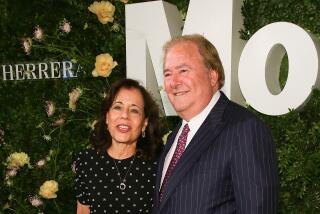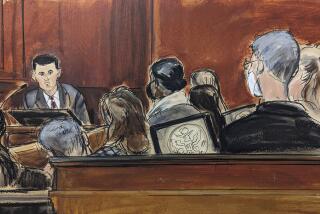Global Swaps Misled, Data Show
- Share via
WASHINGTON — Executives at Global Crossing Ltd. misled their bankers as well as investors in undertaking controversial swaps of capacity on their telecommunications networks to boost revenue and meet financial forecasts, according to evidence released Tuesday by congressional investigators.
The disclosure could give lawmakers important ammunition as a House Energy and Commerce subcommittee prepares to grill Global Crossing founder and Chairman Gary Winnick next week. Global Crossing filed for bankruptcy protection in January.
One e-mail from Global Crossing Chief Financial Officer Dan Cohrs warned that Global was at risk of violating bank loan covenants affecting some $6 billion in financing. Cohrs added that Global’s ability to secure significant network capacity swaps would have “a big effect” on keeping the loans in good standing.
“We will be tight on our bank covenants as we go through the year,” Cohrs wrote in an e-mail dated May 12, 2001. He noted that Global soon would exceed the ratio of debt-to-earnings before interest, taxes, debt and appreciation allowed in its bank loans by 17%.
The e-mails point to a compelling motive for the firm’s obsession with meeting quarterly projections and completing last-minute capacity swaps to do so.
Previously, investigators believed the company engaged in last-minute deals to avoid disappointing Wall Street. But defaulting on a debt agreement would have been much worse.
“If you just miss your forecast on Wall Street, it’s mainly just a business embarrassment and your stock price is going to take a hit,” said Carr Conway, a senior forensic accountant at Dickerson Financial Investigation Group in Denver. “If you don’t make your [bank] covenants, theoretically the lenders can call your debt. That’s so serious that it had to be a matter of great discussion.”
The e-mails were bolstered Tuesday by damaging testimony from eight other telecom executives involved in negotiating the controversial swaps. The star witness was Roy Olofson, who worked in Beverly Hills as Global Crossing’s vice president of finance before he was let go last year.
Olofson told the House panel’s investigations and oversight subcommittee that Global’s former chief executive, Tom Casey, misled financial analysts about deals in the first two quarters of 2001 in which Global swapped network transmission capacity with rivals to artificially boost revenue.
“I was very surprised to hear ... Tom Casey unequivocally state [to investment analysts] that there were no swaps in the quarter,’ ” Olofson said. “There was a general sense of uneasiness about these swap transactions.”
Opening a full day of testimony, Subcommittee Chairman Rep. James C. Greenwood (R.-Pa.) said deals consummated by Global Crossing and fellow telecom provider Qwest Communications International Inc. were questionable, coming at a time when the once-booming telecommunications market was imploding.
“Were these capacity swap transactions undertaken to respond to new business opportunities, or were they merely designed to provide the appearance of expanding business and growing revenues?” he said. “Evidence uncovered by this committee’s investigation suggests that the latter is true.”
Officials of the companies were desperate to maintain their highflying images so that top executives could sell off their stocks before the true financial health of the companies became known, panel investigators believe.
Winnick, for instance, who has led Global since its founding in 1997, sold nearly 10 million shares of his company’s stock for $124 million in May 2001 just as the e-mails released Tuesday were informing top officials of Global’s dire financial condition.
In an interview after Tuesday’s session, Greenwood expressed satisfaction that his subcommittee was beginning to get to the bottom of a series of financial scandals in the telecommunications industry that has rocked Wall Street investors and Main Street pensioners.
“The Mr. Winnicks of the world made millions and millions of dollars and Mr. and Mrs. America got creamed,” he added.
Global Crossing officials declined to comment on the newly released e-mails or the specifics of Tuesday’s testimony, but a spokeswoman said the company “has actively cooperated” with the committee investigation since March and is “eager to resolve these inquiries and will continue to cooperate. “
Officials from Qwest, which provides local phone service in 14 Western states, also declined to comment on Tuesday’s testimony. The company will “continue to cooperate” with the panel’s investigation, spokesman Tyler Gronbach said. The e-mails and testimony from Olofson and the other witnesses will lay the foundation for an Oct. 1 hearing, at which Winnick and former Qwest Chief Executive Joseph Nacchio have been asked to testify. They are expected to be grilled about whether accounting decisions and business deals at their respective companies were aimed at camouflaging the deteriorating financial condition at Qwest and Global while top executives sold off shares.
In addition, Qwest board member and former Chairman Philip Anschutz, the telephone company’s largest shareholder, may be called to testify before the panel, according to committee spokesman Ken Johnson.
Although most of the witnesses who appeared Tuesday volunteered to testify and were considered “friendly” to the panel’s probe, they sometimes engaged in finger-pointing and contradicted each other on key issues.
Under questioning Tuesday afternoon from Rep. W.J. “Billy” Tauzin (R-La.), Kym Smiley, former director of strategic negotiations for Qwest, disputed claims from Global Crossing witnesses that Qwest’s capacity swaps were contingent upon secret oral side agreements that gave the company more flexibility to treat the deals as capital expenses, allowing the company to hide losses.
“Are you saying Qwest and Global Crossing disagree over what oral assurances were given?” Tauzin said.
“I do not believe there was a verbal agreement,” Smiley said. “I have no personal knowledge of a verbal agreement.”
Panel members also questioned former Qwest Chief Financial Officer Robin Szeliga, now a Qwest executive vice president, about whether the company retaliated against investment banking firm Morgan Stanley for a negative research report on Qwest by not using Morgan Stanley’s financial management services.
The panel released copies of Szeliga’s notes from a June 2001 meeting at which officials agreed to “quietly close Morgan Stanley out of the company” after the critical note about Qwest. Qwest never again gave significant business to Morgan Stanley, Szeliga told the panel.
Several witnesses said they believed to the end that the telecommunications market would rebound and that more transmission capacity would be needed.
“Most of these transactions were very good transactions,” said Robin Wright, former vice president of carrier sales at Global. She was among investors who bought more Global shares even as the telecom market was showing signs of a free fall, she said. “I lost too,” Wright said.
In Tuesday trading, Qwest shares fell 18 cents to $2.61 on the New York Stock Exchange.
More to Read
Inside the business of entertainment
The Wide Shot brings you news, analysis and insights on everything from streaming wars to production — and what it all means for the future.
You may occasionally receive promotional content from the Los Angeles Times.










